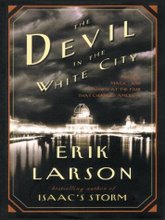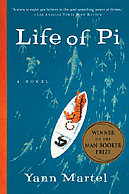Against all odds, I managed to start AND finish Life of Pi this weekend. My house is on the market and my mind is pre-occupied with things like SELL FOR THE LOVE OF GOD THE CLOCK IS TICKING, but I found myself at the gym with no desire to have sweaty headphones upsetting the balance of ear cleanliness I've become accustomed to, on top of the irrational pressure I've placed on myself to participate in this (very patient and lenient) book club I've joined... and suddenly Life of Pi was my treadmill distraction.
I'll admit that I've never been a member of any book club, let alone an online one. I've held back for so long that I've seen enough other members admit to the same thing to put me at ease about this sad fact. Notice I'm still mentioning it, though... take this all with a grain of salt, I guess is my point. Also, I'm trying to say that I'm not exactly positive how to start a discussion on a book with as many layers as I detected in Life of Pi.
***WARNING: Possible Spoiler Ahead***
Luckily for me, there is a nifty Reading Group Guide in the version of the book I bought. It has a series of thought-provoking questions, all of which are equally as profound, I'm sure. I'm going to pick one that works for focusing on what to me is the crux of the book: #22, Which story do you believe, the one with animals or the one without animals? I'm not sure I can directly answer this question, but I will say this: I read the first two parts of the book without questioning any of the "facts." When I got to the third part and Pi was pressured to tell a different story, I was pretty unhappy. I clung to the animal story with all my might. I wanted it to be true, as harrowing as I'd thought it was originally. I might have actually felt angry at the investigators from the Japanese Ministry of Transport for pressuring Pi to come up with something different. Like Pi, I had become attached to Richard Parker, that wild, dangerous, dependent, unpredictable killer companion. When the animal characters were replaced with human ones, when Pi explained in human terms what he'd endured for months at sea, it felt remarkably more unbearable, and to my chagrin, remarkably more believable.
Throughout the re-telling of Pi's experience, he makes reference to imagination, belief, and the role of the story in one's life. He accepts what most people would classify as three conflicting religious belief systems when he simultaneously practices Hinduism, Christianity, and Islam. When confronted on this and told he must choose only one faith, his response is "I just want to love God." Pi simultaneously accepts the frameworks he's given, no matter how contradictory, no matter how unpalatable, and molds them to what he views as a universal expression of gratitude for life. He accepts atheism as a belief system, but rejects agnostic doubt as a potential life-long philosophy, claiming that doubt is not a habitable realm, but one that must be visited temporarily and later abandoned for more solid ground, "the better story."
Life is ultimately only relatable by the story-telling of our own experience. Pi's two stories begin and end identically; the differences between the tellings come down to character details, but those details profoundly alter the reader's view of the experience. The Japanese investigators ultimately have to choose which story they'll tell, and even after their significant and vocal doubt surrounding Pi's first telling, ultimately the one they pass on in official record is "the one with animals," which they deem in irony, emotional self-defense, or spiritual respect, the better story. This surprised me, until I realized, as I tried to describe the book to my husband, that I was telling Pi's first story as the story, the "real" one.
Sunday, February 25, 2007
Subscribe to:
Post Comments (Atom)













10 comments:
I've got to admit, the "second story" (or the "O. Henry ending", as I've been thinking of it), did throw me for a loop, and tied things up for me in a comprehensive, though horrible, way.
But at the end of the book, I still couldn't see the relationship between Pi's religious beliefs and his experiences. The preface of the book described a "story that will make you believe in God", and Pi's acceptance of Hinduism, Islam, and Christianity in the early chapters reminded me in a way of "Siddhartha"; I was expecting Pi to have reached some sort of enlightenment or deeper understanding of himself or the universe or God or something by the end. This expectation of mine was reinforced by the incredible circumstances of his life on the lifeboat with Richard Parker - I was thinking that his unfailing belief, while going through all of these hardships, was going to pay off for him, somehow.
In thinking about the book now, I wonder if "god", or "religion" (be it Hinduism, Christianity, or whatever) weren't just imaginary coping mechanisms for Pi, like the construct of the animals sharing his boat. If so, did they work for him? I guess so - he survived. But they certainly didn't lead to any greater meaning for him, or for me. In fact, like Richard Parker, his belief in god & his different religions seems to be another of those things that aren't true, but helped him to (barely) get by. I'll keep my agnostic doubt, thank you.
Of course, I've probably missed the point entirely. I did really enjoy the descriptions of catching dorado, though :)
iflyg - You just articulated what I was having trouble working through in my mind. Pi kept talking about God as love, and referred to "turning to God" during his hardships, but he also talked just as much about despair and darkness (even temporary blindness). I also think because he "accepted" all three faiths, his philosophy / spirituality was more of a coping / survival mechanism (like you mention) than a profound universal / spiritual understanding.
You two are brilliant. I haven't finished Pi... yet. The events of the last two weeks have made doing much of anything impossible but based on what you guys have to say I'm going to try and finish it tonight.
I agree w/ my good pal Cape Buffalo -- you guys are very insightful.
I'm a bad bookclub member, I haven't finished yet either. It was a very slow start for me, but at least now he's finally in the damn boat!
I do have to say that you gotta love his use of language -- I mean, not too many people use words like catholicity.
I'm shooting to have it done by the end of the week -- I promise
Sorry
Kristen- I hear you. I finished it and really liked it by the end. It was really hard to get into but I ended up enjoying it once I finally got into it. I lent it to my mom and, in her words, "It got better, but it could have BEEN better." I have to agree, but still liked it. I love his child-like view of god as love. If only every religious person was unable to see all of those boundaries that organized religion puts onto God...we'd have a hell of a lot fewer wars.
I'm still unfinished, as well, thanks to the narcotic cough syrup I've been taking at night. I keep falling asleep before I can read much, but I'm plugging away.
Perversely, I'm now looking forward to reading the rest of it after reading the other analyses so far. I have found this book slow going (this is the second or third attempt at reading it for me!), but reading what everyone else is thinking has made me determined to stick with it.
I FINALLY finished!
Okay -- it was a difficult book to commit to -- I don't think I can definitively say that I liked it, but I am glad that I finished it.
The writing was good -- although, in places I found myself reading, then re-reading because I got lost. Some parts (the gruesome ones) were told with such detail and offered such clarity that I physically got queasy -- while others kind of brushed up against a description and left me with an incomplete picture.
The end tied it up for me -- the mind can protect the soul when necessary.
I finally finshed the book. How do we explain the meerkats? Even if he did make it up to deal with the incredible journey, how do we explain the meerkat bones? Do you think that the story of the tiger is a way to explain that god (in any belief system) doesn't exist too? I liked the story of the animals so much more than the 'O. Henry' ending that I will choose to believe that one instead of the easily packaged one (and I am pretty much an atheist).
I agree with Arwen the tiger is relaated to God. I believe that the second story was for the people that font believe in God or miricles. While the one with animals is like faith you cannot tell if it is true or not but if you believe it is true(I believe) Te tiger is almost God because he kept Pi alive. As for IFLYG you did miss the point it is you just have to believe. Pi even said it himsel "you have to believe one story the one that is more far fetchd or the more believable one" some people find it easier to believe like a atheisist (the second story) and some chose believe in the unbelievable which is basically what religion is all about (the fist story)
Life of Pi was a very good story and I believe, as far as Pi telling two stories, that the second story, the one with the humans, is the real story that happened. Why? Because Pi may actually be trying to escape the trajedy and horror of losing his mother, seeing his mother die, seeing humans being eaten by other humans, and the other monstrous events that happened by telling a story about animals to the interviewers and letting his imagination run wild. I am not sure if this is true but Pi did say "and so it Goes with God." meaning any story can be the real one based on what u see and believe.
Post a Comment